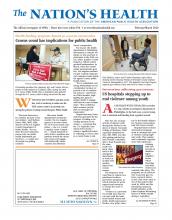An investigation of how pharmacies relay information about disposal of critical drugs left researchers, like consumers, looking for answers.
The study, published in the Annals of Internal Medicine in December, found that few pharmacies are able to share accurate information about the disposal of antibiotics and opioids when asked.
The team of researchers from the University of California-San Francisco found that less than half of U.S. pharmacies were able to relay proper disposal instructions and only 10% offered to do what the U.S. Food and Drug Administration recommends — take unused medications back from customers.
“This clearly points to the need for better dissemination of information on proper medication disposal,” Hillary Copp, MD, MS, associate professor of urology at UCSF and the senior author of the study, said in a news release.
Study researchers posed as parents whose children recently had surgery. They spoke to employees at almost 900 California pharmacies, asking them how to dispose of an antibiotic and a pain reliever containing an opioid compound. Only 47% of pharmacies provided the correct instructions on antibiotic disposal, and just 19% gave accurate instructions for opioids.
“A pharmacy is a place where medications are dispensed, so it is natural for people to look to this same location for advice on how to dispose of unused medications,” Copp said.
Improper disposal of prescription drugs can be dangerous for both individual, community and global health. If left in the home, antibiotics may be taken when not necessary, contributing to increased antibiotic resistance. Leftover opioids can contribute to child poisonings or misuse.
FDA first recommends taking unused drugs to a drug take-back location, such as a pharmacy or hospital. If a location is not accessible, there are specific disposal instructions that may change depending on the drug. Antibiotics and other common medications can be mixed in with something such as coffee grounds or cat litter, sealed in a plastic bag and then thrown away. However, because they are potentially dangerous, opioids should be flushed down a toilet. FDA offers a list of medications that can be flushed if there are no other disposal options.
The U.S. Drug Enforcement Administration periodically hosts National Prescription Take Back Days, when temporary collection sites are hosted around the country. The next event is April 25.
For more information on the study, visit http://bit.ly/2ulJrY2.
- Copyright The Nation’s Health, American Public Health Association









